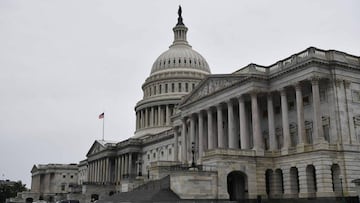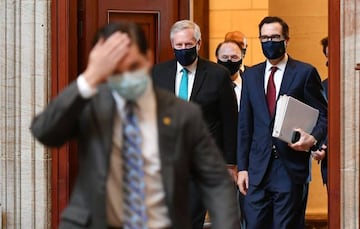Second stimulus check: is a deal possible if not settled by Friday?
Steven Mnuchin, Mitch McConnell, Mark Meadows, Nancy Pelosi, Chuck Schumer. Can they agree a package before 7 August, and what happens if not?

Republicans and Democrats are continuing in their negotiations with the objective of reaching a bipartisan agreement on the next economic rescue package, which is to include a much-needed second stimulus check for millions of American households that are struggling to deal with the financial implications forced upon them following the coronavirus pandemic.
Some senior officials had claimed at the beginning of the outbreak, and throughout the crisis, that the problems would quickly pass. This, as is tragically obvious, has not been the case.
HEALS Act negotiations: Congress recess sees time running out
Every day that passes adds further pain, with record number of people finding themselves without a job and a regular income. They have been waiting in hope that support could be sent their way, following that of the initial CARES Act, which included Economic Income Payments. And now, after a number of delays, we are reaching what many believe to be the crunch date: Friday 7 August is scheduled to be the final day before Congress goes into recess, not to return until 8 September. This leaves the lawmakers with just hours to reach consensus, unless there is a different agreement, to postpone the start of the recess.
The stimulus check appears to be agreed by all parties but there are other obstacles in the way to reaching agreement, most notably the $600 weekly unemployment benefits that the Democrats want to remain in any bill. On Wednesday Treasury Secretary Steven Mnuchin sounded the alarm bells by stating that a deal may not be reached at all if the major issues are not ironed out by Friday.
"We're trying to get a deal that's good for the American public and American workers,” he told reporters. “Our objective is to try to reach an understanding of the major issues by Friday. If we can't reach an agreement on the major issues, it's going to be hard to complete a deal."
Senate Majority Leader Mitch McConnell agreed with Mnuchin about an agreement being required. Speaking to CNBC on Thursday he said: “I think we need an additional agreement," before adding that ”the economy does need an additional boost."

Nancy Pelosi, for her part, was also saying that a deal was being strived for. ”The leader and I are determined that we will come to agreement. But it has to meet the needs of the American people," the Speaker of the House said. Her Democratic colleague, Senate Minority Leader Chuck Schumer, similarly said: "They have made some concessions which we appreciated. We made some concessions which they appreciated," although did confirm the common news that the two sides "are still far away on a lot of issues."
Second stimulus check: what happens if there is no agreement by Friday?
Although some talk has been around delaying the recess to allow more time to reach an agreement to help the country, some are less optimistic. Mark Meadows, the White House Chief of Staff, for example, who was quoting as saying that he was ‘extremely doubtful’ about a deal being reached and that Friday will be the end of discussions.
Via a thread from the New York Times’ Emily Cochrane, Meadows stated: “I think at this point we’re either going to get serious about negotiating and get an agreement in principle OR - I’ve become extremely doubtful that we’ll be able to make a deal if it goes well beyond Friday."
On the question of whether a lack of agreement would lead to executive action from President Trump, he replied: "The president continues to look at executive action on a variety of issues....I don’t know I would put them necessarily on the timeline you outlined."
Over the coming hours leading to the deadline, eyes and ears will be fixed on the developments being made by the countries leading lawmakers.
- Coronavirus stimulus checks
- Crisis económica coronavirus Covid-19
- Ayuda económica
- Donald Trump
- Ciencia
- Coronavirus Covid-19
- Cooperación y desarrollo
- Crisis económica
- Estados Unidos
- Pandemia
- Coronavirus
- Recesión económica
- Enfermedades infecciosas
- Virología
- Epidemia
- Coyuntura económica
- Norteamérica
- Enfermedades
- Microbiología
- Medicina
- América
- Economía
- Relaciones exteriores
- Biología
- Salud





